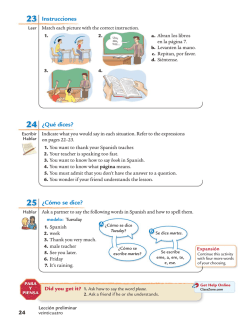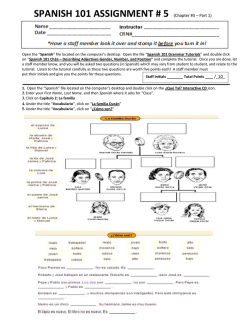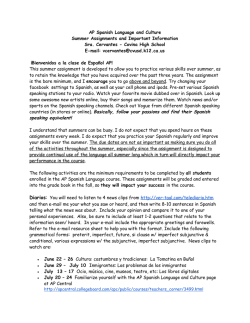
Spanish as a Heritage Language at the University of Oregon
Spanish as a Heritage Language at the University of Oregon ¡Logros, retos, planes y esperanzas! Claudia Holguín Mendoza [email protected] SHL at the UO is an initiative of the Department of Romance Languages to meet the educational goals of students for whom Spanish is a birthright language. http://rl.uoregon.edu The Mission of the SHL at the UO 1. To value and develop Spanish language proficiency, particularly for students who grew up in a Spanishspeaking household or community. 2. To recognize and validate Spanglish and Spanish language varieties in the U.S., giving students the opportunity to integrate and build upon their existing linguistic and cultural knowledge and experiences. 3. To create meaningful connection with local Spanishspeaking communities, acknowledging the fact that languages are shaped both inside and outside academia. Our values • We believe that language is a social phenomenon and as such always necessitates variation due to the constant movement and change that is universally human. Thus, we must approach language study in a way that transcends linguistic hierarchies and assumptions of linguistic accuracy based on the native-speaker paradigm—the faulty assumption that there are correct ways to speak a language, and that there exist “native” speakers who speak these “standard” forms, ignoring the realities of linguistic variation based on identity and location. • In conclusion, we, the Spanish Heritage Language Faculty of the UO, cannot study Spanish as a language independent from its speakers and their sociopolitical realities. This is an ideological position, which we defend as the most ethical and intellectually honest. Al principio… 1. We conducted an auto-evaluation, an introspection as teachers, and as a language program, 2. in relation to our students’ stories, and their experiences. 1. Language Ideologies As Spanish teachers, we have transmitted, directly or indirectly, implicit ideologies about • nationalism: one nation = one language • standardness: a commitment to linguistic purity and correctness • idealized monolingualism: superiority of the educated monolingual speaker Our students’ stories http://rl.uoregon.edu/undergraduate/shl/shl-blogs/ Priscilla Castellanoz at the Romance Languages Commencement • Once I began taking classes I remember I had a big realization regarding me being a part of the first generation college student in my family. It was in one of the several Spanish heritage classes I took. • While doing a documentary about my family I discovered that my grandmother was never given the opportunity to go to school and learn how to read and write, and that my mother growing up very poor had to repeat the second grade four times. This was because the remote location of her school, 2nd grade was the highest level they offered for children to take. Priscilla’s Commencement Speech • I’d like to share with you all, how they Spanish Heritage Program has played an enormous role in me becoming a first generation college graduate. It has helped me recognized the value in being a first generation college student and it has influenced me to encourage others in the Latino community that a higher education is possible. • This was due to the encouragement in investigating my family roots, being placed into courses with students I could relate to and learn from, while discussing topics and issues related to our community that are not usually discussed, and finding passionate faculty members that became influential role models. SHL pedagogy Student learning objectives • “identity trumps grammar”: heritage students sometimes seem resistant to change/progress unless questions of identity are addressed first • treat affective concerns before linguistic issues: the power of linguistic trauma • Use real-world bilingual practices in the classroom: codeswitching, calquing, borrowing, neologisms • raise linguistic awareness of power dynamics inherent in selection of forms • invest heavily in mentoring students outside of class time, in both academic and identity issues • adopt assessment practices that make room for and validate learners’ heritage proficiency and identity. Por eso en todas nuestros cursos… • practicamos la conciencia crítica sobre la lengua / critical metalinguistic awareness. Linguistic attitudes towards varieties of Spanish • Regional racialized and class stereotyped varieties such as, • Andean Spanish, • working class Mexico City Spanish, • Spanish from southern Mexico, • Spanish in Alicante, etc. Ejemplos If in English we have In Spanish we have • Crocodile → Crocodilo Cocodrilo • Accent → Accento Acento • Object → Objecto Objeto In Spanish we have • Caer → • Traer → • Haber → Caiga Traiga Haiga Caya Traya Haya Ejemplos If in English we have In Spanish we have • Crocodile → Crocodilo Cocodrilo • Accent → Accento Acento • Object → Objecto Objeto In Spanish we have • Caer → • Traer → • Haber → Caiga Traiga Haiga Caya Traya Haya En clase reflexionamos que… • estas son expresiones o usos que han desaparecido en muchas comunidades, en especial en las urbanas, pero que se preservan en otras. • Muchas de estas formas han llegado a los Estados Unidos por la migración de pueblos pequeños o regiones aisladas. En otros casos el español antiguo ha estado en EE.UU. desde la época colonial en Nuevo México, Texas y California por ejemplo. Otros casos de variación (i.e. Conversaciones Escritas de Kim Potowski, p. 57) Generalización de la regla ->(analogía) Este fenómeno ha estado presente desde siempre y en todas las lenguas, es parte de cómo funciona la lengua y el cerebro humano. Se aplica una regla a todas las formas en vez de conservar excepciones, como por ejemplo poner “s” al final de la conjugación de tú en el pretérito, ya que la conjugación de la segunda persona del singular usualmente lleva “s” en todos los tiempos verbales. i.e. tú comes, comerás, comerías, etc. Tú fuistes / fuites Tú vistes / vites Tú hablastes / hablates Tú comistes / comites Yo conducí / (en vez de yo conduje) El Spanglish (i.e. Conversaciones Escritas de Kim Potowski, p. 110) • Lo estudiamos como una comunidad de práctica en la que participamos en actividades comunes y compartimos ideas. • En el salón de clase creamos un ambiente seguro y libre donde podemos expresar nuestras identidades híbridas y fluidas. SHL at the UO • “We propose pedagogical practices that foster open classroom discussions regarding which social values give these stigmatized linguistic forms their different negative social meanings, in relation to racial formations and social class among other factors, • we aim to generate opportunities for both teachers and students to produce the necessary knowledge for them to be able to reevaluate their own prejudices regarding language ideologies and other related social meanings” (Holguín Mendoza forthcoming). Revalorization of non-Standard variety • Creating critical awareness of the socio-historical, political, and economic facts and meanings of “stigmatized words.” • Practical positive effects of this revalorization: Changes in instructors' language attitudes. 2. Anxiety-free classrooms. 3. Changes in all our teaching practices (i.e. L2 courses, upper division courses, placement exams, etc.) 4. Aware agents of change. 1. Empowering students • “This pedagogical model empowers students to make their own informed choices about their language uses in multiple academic and non-academic contexts, • our proposal seeks to redefine the boundaries of the study of language and culture by focusing on relevant concepts such as ‘standard language,’ ‘native speaker,’ ‘monolingualism,’ and ‘bilingualism’” (Holguín Mendoza forthcoming). Spanish Courses in the Department of Romance Languages at UO L2 program Spanish upper division SPAN 201-‐202-‐203 Intermediate Spanish >1, >BA Language Second year SPAN 101-‐102-‐103 Beginning Spanish SPAN 301 Iden>dades hispanas >1, >BA Language SPAN 111-‐112 High Beg. Spanish Intensive SPAN 303 Expresiones arKs>cas SPAN 238 Spanish Around the World >2, >AC General Educa>on Renaissance HIST 248 La>nos in the Americas >2, >IC SHL program SPAN 218 La>no Heritage I >1 >AC Intermediate KEY Black L2 Any student SPAN 248 Spanglish as a Speech Community >2, >AC White SHL SPAN 228 La>no Heritage II >1 >BALanguage Intermediate SPAN 311 Advanced WriDng SPAN 305 Cambio social >1, >IC SPAN 308 Comunidades Bilingües >2 >IP SPAN 312 Spanish in the Media Advanced Wri>ng for Heritage Learners L2 learners acquire Spanish by learning the majority of the target language in the classroom. Heritage learners (SHL) have acquired the majority of the target language in the home or community (not the classroom). Nuestras actividades en la clase se centran en: • Communities of practice (Wenger 1998, Eckert and McConnell-Ginnet 2003) • Critical Metalinguistic Awareness (Holguín Mendoza forthcoming) • è Students’ resilience and agency (Carreira and Beeman 2014) Monolingualism and bilingualism Discussion: Why is monolingualism idealized? How does this idealization affect other groups? By Kelley Léon-Howarth, documented by Luz Romero Montaño, University of Oregon • The public school system does not promote bilingualism, since most students are in sixth grade before they start to study a second language. • There is a lot of diversity in the United States, and we need a more inclusive education system. • There is an idea that in our country people who do not speak English are not “American.” • Before WWI there used to be widespread bilingualism, but afterward there was isolation and xenophobia; and the idealized image of the perfect “American” family was promoted while leaving aside other social groups. • Comparing two languages helps to be familiarized with ones that you don’t know, i.e. quechua • There is a long history of using language to marginalize groups; the Spanish crown tried to impose Spanish language…and to exclude other groups as Muslims, Jews, and even during the 20th century when Franco prohibited and persecuted other languages spoken in Spain. Thank you! ¡Gracias! Agradecimientos especiales al equipo de maestros SHL de la Universidad de Oregón, junto con el Director de Lenguas y profesor Robert L. Davis (From L-R), Alex Zunterstein, Liliana Darwin-López, Kelley León-Howarth, Amy Costales, Heather Quarles, and Claudia Holguín Mendoza. http://rl.uoregon.edu/undergraduate/shl Bibliografía • Carreira, María M. and Tom Beeman. 2014. Voces: Latino Students on Life in the United States. Santa Barbara, CA: Praeger. • Eckert, Penelope and Sally McConnell-Ginet. 1992. Think practically and look locally: language and gender as community-based practice. Annual Review of Anthropology, 21: 461-490. . • Potowski, Kim. 2011. Conversaciones escritas: Lectura y redacción en contexto. Danvers, MA: Wiley. • Wenger, Etienne. 1998. Communities of Practice: Learning, Meaning, and Identity. Cambridge: Cambridge University Press.
© Copyright 2026



